Korean
Japan leader expresses sympathy for Korean colonial victims
Japan’s prime minister expressed sympathy for the suffering of Korean forced laborers during Japan’s colonial rule, as he and his South Korean counterpart on Sunday renewed resolve to overcome historical grievances and strengthen cooperation in the face of shared challenges such as North Korea’s nuclear program.
Comments by Japanese Prime Minister Fumio Kishida during his summit with South Korean President Yoon Suk Yeol — their second meeting in less than two months — were closely watched in South Korea, where many still harbor strong resentment against Japan's 1910-45 colonial occupation of the Korean Peninsula.
Yoon has faced domestic criticism that he had preemptively made concessions to Tokyo without getting corresponding steps in return. Kishida’s statement, which avoided a new, direct apology over the colonization but still sympathized with the Korean victims, suggests he felt pressure to say something to maintain momentum for an effort to improve ties.
“And personally, I have strong pain in my heart as I think of the extreme difficulty and sorrow that many people had to suffer under the severe environment in those days,” Kishida told a joint news conference with Yoon, referring to the Japanese colonial period.
He said he believes “it is my responsibility as prime minister of Japan to cooperate with” Yoon to forge stronger relations.
Kishida arrived in South Korea earlier Sunday for a two-day visit, which reciprocates a mid-March trip to Tokyo by Yoon and marks the first exchange of visits between the leaders of the Asian neighbors in 12 years.
The back-to-back summits were largely meant to resolve the countries’ bitter disputes caused by the 2018 court rulings in South Korea that ordered two Japanese companies to financially compensate some of their aging former Korean employees for colonial-era forced labor. Japan has refused to abide by the verdicts, arguing that all compensation issues were already settled when the two countries normalized ties in 1965.
The wrangling led to the countries downgrading each other’s trade status and Seoul’s previous liberal government threatening to spike a military intelligence-sharing pact. Their strained ties complicated U.S. efforts to build a stronger regional alliance to better cope with rising Chinese influence and North Korean nuclear threats.
In March, however, Yoon’s conservative government took a major step toward mending the ties by announcing it would use local funds to compensate the forced labor victims without demanding contributions from Japanese companies. Later in March, Yoon traveled to Tokyo to meet with Kishida, and the two agreed to resume leadership-level visits and other talks. Their governments have since taken steps to withdraw their economic retaliatory steps.
Yoon’s push, however, drew strong backlash from some of the forced labor victims and his liberal rivals at home, who have demanded direct compensation from the Japanese companies. Yoon has defended his move, saying greater cooperation with Japan is required to jointly tackle North Korea’s advancing nuclear program, the intensifying U.S.-China strategic rivalry and global supply chain challenges.
“We should stay away from a thinking that we must not make a step forward because our history issues aren’t settled completely,” Yoon said Sunday. He said that 10 out of the 15 former forced laborers or their families involved in the 2018 rulings had accepted compensation under Seoul’s third-party reimbursement plan.
Kishida said: “I’m struck by the fact that many people, despite their painful memories from the past, opened their hearts for the future as measures by the South Korean government related to (the fund) move forward.”
Kishida also reaffirmed his government upholds the positions of previous Japanese administrations on the colonization issue, including the landmark 1998 joint declaration by Tokyo and Seoul, but didn’t make a new apology. In that declaration, then-Japanese Prime Minister Keizo Obuchi said: “I feel acute remorse and offer an apology from my heart” over the colonial rule.
Japanese governments have expressed remorse or apologies over the colonial period numerous times. But some Japanese officials and politicians have occasionally made comments that have been accused of whitewashing Tokyo’s wartime aggressions, prompting Seoul to urge Tokyo to make new, more sincere apologies.
Ahead of his summit with Yoon, Kishida and his wife, Yuko Kishida, visited the national cemetery in Seoul, where they burned incense and paid a silent tribute before a memorial. Buried or honored in the cemetery are mostly Korean War dead, but include Korean independence fighters during the period of Japanese rule. Kishida was the first Japanese leader to visit the place in 12 years.
“Kishida’s comments about Koreans who suffered under Japanese colonialism may be criticized for not being more specific about historical perpetrators and more apologetic toward historical victims,” Leif-Eric Easley, a professor at Ewha University in Seoul, said. “But Kishida did visit South Korea’s national cemetery and said that his heartfelt views, respect for the past, and recognition of current global challenges produce a sense of responsibility for improving Seoul-Tokyo relations.”
Yoon said talks among Seoul, Tokyo and Washington are underway to implement their earlier agreement on a faster exchange of information on North Korean missile tests. Yoon said he and Kishida reaffirmed that North Korea’s nuclear and missile programs pose a grave threat to the two countries and the rest of the world.
In late April, Yoon made a state visit to the United States and agreed with President Joe Biden to reinforce deterrence capabilities against North Korea's nuclear threats. During a joint news conference, Biden thanked Yoon “for your political courage and personal commitment to diplomacy with Japan.”
Yoon, Biden and Kishida are expected to hold a trilateral meeting later this month on the sidelines of the Group of Seven meetings in Hiroshima to discuss North Korea, China's assertiveness and Russia's war on Ukraine. Yoon was invited as one of eight outreach nations.
Kishida said he and Yoon would pay respects before a memorial for Korean atomic bomb victims in Hiroshima. In another apparent conciliatory measure, Kishida said Japan will allow South Korean experts to visit and inspect a planned release of treated but still radioactive wastewater from the damaged Fukushima nuclear power plant.
2 years ago
10-Step Korean Skin Care Routine
Have you ever wondered how Korean women have such beautiful, radiant, and well-toned skin? The reason is that most beauty-conscious Korean women follow a 10-step skincare routine that makes their skin look like it never ages. To protect your precious skin from dirt and the effects of weather it is essential to follow some skin care steps on a regular basis. Let’s take a look at the 10-step Korean skincare routine.
Korean 10-Step Beauty Care Regimen
Before using Korean products, you need to test whether your skin is sensitive or not. To test this apply the product on the back side of your hand and wait for 24 hours to see the result. If you don’t see any reactions to your skin, you can start using the Korean beauty regimen.
Oil Cleanser
The first step is using an oil cleanser to remove makeup and dirt. Koreans have a very comprehensive approach to their skin. They believe in treating their skin gently, and double-cleansing is most of them to care for their skin.
Read More: How to find right perfume, body spray for you
You may know that oil and water push back each other. So it is not wise to start with a water-based cleanser because it will not remove oily impurities. With oil cleanser, you can just ensure your skin is free of SPF, makeup, and the body’s natural sebum.
To do an oil massage, mildly pat it in a circular motion on your face for three minutes. This massage will increase blood flow and allow the cells to carry out their functions smoothly.
Foam Cleanser
The follow-up of the oil cleanser is the using a foaming or waterproof cleanser that will remove the piled-up dirt, sweat, and excess chemicals. The cleansers, together cleanse the skin closely.
Read More: Is Your Lipstick Slowly Killing You?
However, foaming cleansers have a bad reputation in that they dry and strip the skin because of their high pH and sulfate value. So you are recommended to use a gentle, hydrating, low pH, water-based natural cleanser in your daily skincare routine.
If you have sensitive skin it would be better to use DIY cleaners. Thus your skin gets the cleanse it needs without any harm.
Exfoliant
Your next step in your skincare regimen after foam cleanser can be exfoliation. Exfoliant instantly gives you baby-soft and smooth skin. You need to be aware of two types of exfoliators: physical and chemical.
Read More: Perfect Hair Color: Ways to find out and making the most of it
A physical exfoliator is a crooked tool that throws away the topmost layer of skin. Sugar scrubs, cleansing towels, and peeling gels can be best among many others.
However, chemical exfoliators are primarily made up of acids including AHAs, BHAs, and PHAs. Although the word ‘acid’ might seem terrifying, they are very effective too! A chemical exfoliator helps scrap away your dead skin cells and encourages cell turnover and refresh. A chemical exfoliator works on the skin barrier and sinks into the deeper layers of your skin also.
If you have sensitive skin, physical exfoliators are usually not recommended for you as they only work on the surface of the skin.
Read More: 10 Tips to Make Your Perfume Last Longer
Toner
Toners in the K-Beauty skincare routine are not the same as other Western toners. They are exceptionally milder and gentler. The great thing is that they provide the first layer of hydration after your cleaning and exfoliating. Korean toners are not alcohol-laden.
They put together the balance of the pH level in your skin. The ingredients of Korean toners sink deeper into the skin by drenching it with hydration. In a word, these awesome products prep your skin for the next steps that follow in your 10-step skin care regimen.
You can use cotton pads to apply the toner so any remaining dirt can be easily absorbed by the cotton.
Read More: Easy Skin Care Tips For Men
Essence
Essence is another unique step that is only found in the Korean skin care regimen. Essence cares for your skin with hydration. If you compare your skin to a sponge, what will be the scenario?
When the sponge is dry, it loses its ability to absorb, but, when you hydrate it by dipping it in a bowl of water, it will work much more efficiently because it has been sufficiently hydrated.
The using process of essence is very easy. Take a few drops on your fingertips and massage them gently on the skin.
Read More: Contact Lenses: Side Effects & Danger
Serum
Now your skin is clear and your skin will absorb the more important ingredients effectively. Serums have active ingredients that effectively target and treat skin issues like dark spots, wrinkles, pigmentation, and dullness. To improve your overall skin, this step of the Korean skincare regimen is essential.
You want to use a weekly ampoule pack in your Korean 10-step skincare routine to balance out your chemical use. Try to apply the serum daily. Take a small amount of the product onto your palm and pat it gently on your skin.
Sheet Mask
Sheet masks are enriched with beneficial vitamins and minerals. They are hydrating also to keep your skin soft and supple. Sheet masks are great to give your skin an enormous dose of moisture, and clarifying marks. It also gives the skin the glow it requires.
Read More: How Do Sunglasses Protect Your Eyes?
You will find a standard-size sheet mask meant suitable for your face shapes and sizes. Apply it to your face and keep it on for 20-30 minutes. To get an instant glow, you can use a sheet mask.
Eye Cream
You will get active ingredients to target various concerns related to the sensitive eye area in eye cream. An eye cream provides a moisturizing and sealing effect. To treat your eye area first, apply eye cream before your moisturizer.
Take a very small amount of eye cream and smoothly apply it around the eye area.
Moisturiser
Koreans love moisturizer because it gives skin the water it needs to be well hydrated. However, you need to introduce moisturizer to the skin almost last, as many moisturizers contain plosives. These ingredients have a hydrophobic film on the surface of the skin. They form a thin layer of oil on the skin to prevent water from evaporating.
Massage moisturizer on your skin for 10 to 15 minutes.
SPF
SPF guards your skin and protects it from sun rays. You can use a broad-spectrum sunscreen to prevent UVA and UVB rays from damaging your skin.
For oily skin, use a physical sunblock or mineral sunscreen.
Bottom Line
Taking care of your skin is a form of self-care and self-love. Although these 10 steps of the Korean skin care routine are time-consuming, once you are habituated to these steps, these steps won’t take much time at all. However, don’t forget to check the authenticity of the skin care products before applying them to your precious skin. If you face any skin-related problem consult with a dermatologist without delay.
3 years ago
Korean Film Festival 2022 opens
Showcasing the brilliance of globally acclaimed Korean films, the three-day Korean Film Festival 2022 was inaugurated at the National Museum Auditorium in the capital's Shahbagh on Wednesday.
State Minister for Cultural Affairs KM Khalid joined the opening ceremony of the festival organised by the Korean Embassy.
South Korean Ambassador to Bangladesh Lee Jang-Keun and National Museum Director General Md Kamruzzaman also spoke.
"Bangladesh and South Korea have many similarities in history, tradition and culture. Based on our similarities and strong diplomatic ties, cultural exchange between the two nations can be one of the means of strengthening mutual cooperation. And this festival is a testament to that," Khalid said.
"2023 will mark the 50th anniversary of diplomatic relations between Bangladesh and South Korea. To celebrate the occasion, cultural exchange between the two countries will be increased through special events."
Khalid expressed deep grief over Halloween stampede in Seoul, the capital of South Korea on October 29. A one-minute silence was observed at the ceremony.
Read more: Winners of K-pop contests Dhaka announced
The embassy has selected these five films for this year's festival from various genres of Korean films, including comedy, thriller, action and animation, which will reflect and showcase various aspects of Korean history, society and modern culture.
The festival began with "Escape from Mogadishu" at 6pm after the opening of the festival at the National Museum Auditorium.
Thursday, two movies will be screened at the festival – "Dude in Me" at 2pm and "The Battle of Zangsari" at 5pm. Friday, the festival will screen "Underdog" at 11am and "The Edge of Shadows" at 3pm.
Read more: Bangladeshi food products appreciated at South Korea fair
3 years ago
Korean concert enthrals Dhaka audience at Hatirjheel
The musicophiles in Dhaka were grooved on Saturday night with a special musical presentation by the Korean fusion music band “E-Sang” at the Hatirjheel Amphitheatre in the capital.
The Embassy of the Republic of Korea hosted this live Korean music concert, in collaboration with RTV.
This was the first outdoor cultural event organized by the Korean Embassy since the outbreak of the COVID-19 pandemic.
Md Atiqul Islam, Mayor of Dhaka North City Corporation, joined the event as the chief guest, alongside Lee Jang-keun, Korean Ambassador to Bangladesh.
“Bangladesh and Korea have a very strong relationship. In Korea, we have a significant force of skilled manpower. Additionally, they always support our economic projects and we have a great fanbase of Korean music and culture in our country,” Mayor Atiqul said in his remarks.
He also joined the collaborative performances with the Korean artists at the event.
Welcoming the audience to this special exhibition of Korean music, Korean Ambassador Lee Jang-keun said, “Due to the COVID-19 pandemic, we couldn't arrange any event outside for two years. We are returning to organise our outdoor events in Dhaka with this one. The E-Sang Band will perform today, I hope you like it.”
Read: Shironamhin to feature in ‘Concert against violence’ at DU
3 years ago
Champions Hockey: Korean, Japanese teams arrive Wednesday
Korea and Japan will be the first two foreign teams to arrive in the capital on Wednesday to participate in the six-nation Hero Asian Champions Trophy (Hockey) ‘2021 beginning on January 14 at the Maulana Bhashani National Stadium here.
Participating countries are: India, Malaysia, Korea, Japan, Pakistan and hosts Bangladesh
Korean and Japanese teams will arrive in the capital at 21.05 hours on Wednesday by a flight of Singapore Air Lines.
READ: Champions Hockey: 4 more players included in Bangladesh’s preliminary squad
India will be the 3rd foreign team to arrive here on Friday (Dec 10) at 12:30 hours by an Air India flight while the Pakistan team is scheduled to reach Dhaka at 16:40 hours on the same day (Friday).
Malaysia will be the last foreign team to arrive here on Sunday (Dec 12) at 22:00 hours by Malindo Air flight.
India will play Korea in the opening match at 3:30 pm on Jan 14. Bangladesh will play Malaysia at 6; pm while Pakistan will play Japan at 8:30 pm in other two opening day’s fixture.
The titan battle between India and Pakistan will be held on Jan 17 at pm 3:30 pm.
Earlier, Bangladesh Hockey Federation (BHF) announced a 28-member preliminary squad of Bangladesh national hockey team for the heavy weight tournament and later they added four more players in the squad as per requirement of the team’s Malaysia Head Coach Gobinathan Krishnamurty.
The four newly recruited players are: Al Nahian Shuvo, Raju Ahmed Tapu, Abed Uddin and Razibul Hasan Rocky.
READ: Premier Hockey: Mariner Youngs clinch title beating Mohammedan 3-2
The training session of Bangladesh team began on last Wednesday (Dec 1) at BKSP in Savar.
28-member Bangladesh squad: Biplob Kujur, Abu Sayed Nippon, Ashim Gop (goal keeper), Khorshedur Rahman, Farhad Ahmed, Ashraful Islam, Shohanaur Rahman Sabuj, Mehdi Hasam, Rezaul Karim Babu, Monoj Babu, Shafiul Alam Shisir, Sarwar Morshad Shawon and Khaled Mahmud Rakin (defender),
Sarwar Hossain, Roman Sarkar, Nayeemuddin, Fazle Hossain Rabbi, Hasan Jubair Niloy, Prince Lal Samanta (mid-field), Rasel Mahmud Jummy, Milan Hossain, Mainul Islam Kaushik, Arshad Hossain, Mahbub Hossain, Deen Islam Emon, Rakibul Hasan, Pushkar Kisha Mimo and Rajub Das.
4 years ago
S Korea to provide $ 100mn loan to help Bangladesh’s economic recovery
The government of South Korea has approved US$ 100 million in concessional loan from Economic Development Cooperation Fund (EDCF) to help the recovery of Bangladesh’s economy hit by the Covid-19 pandemic.
The new concessional loan of US$ 100 million will be used to implement several projects aimed at advancing public finance management system and improving small and medium-sized businesses struggling from the repercussion of the pandemic.
The amount would be released as soon as the loan agreement is signed between the Korea EXIM Bank and the Bangladesh Government which is expected to be done within the year.
Also read: Korea promotes young entrepreneurs’ development through business curriculum at universities
EDCF is a Korea’s development financing program for assisting the socio-economic development of developing countries.
The Republic of Korea has already provided US$ 50 million of EDCF loan as budgetary support in December 2020 to to help Bangladesh’s efforts for fighting against the COVID-19 pandemic. It is the second provision of this type of concessional loan.
It will be the first EDCF loan to be implemented under the new EDCF Framework Agreement for the years 2021 through 2025 which was signed between the two Governments on 24 October 2021, said the South Korean Embassy in Dhaka on Monday.
Also read: S Korean envoy Lee for diversifying collaboration with Bangladesh
According to the agreement, the Korean government will provide up to US$ 700 million of concessional loans to the government of Bangladesh for the five year period.
Bangladesh is the second largest recipient of the EDCF loans worldwide in aggregate amount.
So far, the Republic of Korea has funded 24 development projects of Bangladesh with total amount of USD$ 1.2 billion US dollars through the EDCF.
4 years ago
Notable works of Bengali literature to be translated to Korean: KM Khalid
State Minister for Cultural Affairs KM Khalid on Monday said significant books in Bengali are being considered to be translated into Korean language and the translation department of the Bangla Academy will take necessary steps in this regard.
The State Minister shared this information while attending the award giving ceremony of the "Ujan Book Review Contest 2021" for two translated books 'Korean Poetry' and 'Korean Story' as the chief guest.
The two books were published by the publishing house Ujan, in collaboration with the Literature Translation Institute, Korea at the Poet Sufia Kamal Auditorium of the Bangladesh National Museum in Shahbagh.
Read: Poet Nurul Huda appointed Bangla Academy director general
At the event, KM Khalid said that South Korea is a true friend of Bangladesh. After independence, South Korea extended its helping hand in rebuilding the country, and 2023 will mark the 50th anniversary of diplomatic relations between Bangladesh and South Korea.
He also added that South Korea is the third largest development partner of Bangladesh, with about 75,000 jobs filled by Bangladeshis at the Korean Export Processing Zone (KEPZ) in Chittagong, and about 20,000 Bangladeshis working in South Korea.
Moreover, about one and a half thousand Bangladeshi students, teachers and researchers are pursuing higher studies at various levels in Korea’s world class education system. “Overall, South Korea is one of the leading development partners of Bangladesh,’ Khalid said at the event.
Mentioning that Bangla Academy is an organization dedicated to the development of the Bengali language and culture established in the context of the Language Movement of 1952, Khalid expressed his hope that the academy would be able to fulfill its major objective.
Read: 10 picked for Bangla Academy Literary Award
Chaired by Director General of Bangla Academy Poet Muhammad Nurul Huda, the event was also joined by Lee Jang-Keun, Ambassador of South Korea to Bangladesh, as the special guest speaker.
Chanda Mahbub, translator of 'Korean Poetry', Saraishwarya Muhammad, translator of 'Korean Story', poet Sohail Hasan Ghalib and translator Sheuli Fateha also spoke on the occasion.
At the ceremony, KM Khalid also handed over the prizes to the three winners of the book review contest and ten selected participants.
4 years ago
Korean Kido group to invest $ 31.17 mln at Adamjee EPZ
South Korean company Kido Dhaka Limited will invest $31.17 million to establish a garment and manufacturing industry at Adamjee Export Processing Zone (EPZ).
Bangladesh Export Processing Zone Authority (BEPZA) and Kido Dhaka Co. Limited signed an agreement on Monday at BEPZA complex in the capital.
BEPZA' member (investment promotion) Ali Reza Mazid and acting director of Kido Dhaka Limited Ahn Young Dae Joseph singed the agreement document on behalf of their respective sides.
Also read: Bangladesh an attractive investment destination: Korean envoy
Kido is a renowned sportswear manufacturing industry of South Korea. They have also 5 plants in Vietnam, Myanmar and Indonesia.
The company has a big investment plans in Bangladesh and primarily they will invest at Adamjee EPZ, said Young Dae.
They also have a plan to takeover sick industrial plants in different export processing zones to modernize those with updated technology, he said.
The company, fully owned by Korean Kido group, will produce 2 million pieces of jacket, motorcycle safety jacket, leather & fiber jacket, work jacket, sport jacket, fleece jacket, baby warmer, soft shell jacket, sweatshirt, vest, work-wear, coverall, hospital gown, protective cloths and Personal Protection Equipment ( PPE) annually.
Also read: S Korea for diversifying areas of cooperation, elevating ties with Bangladesh
The company will create job opportunities for 6040 Bangladeshi nationals.
BEPZA's new chairman Major General Abul Kalam Mohammed Ziaur Rahman and its outgoing chairman Major General Md Nazrul Islam were also present at the agreement signing ceremony.
BEPZA's outgoing chairman Major General MD. Nazrul Islam said BEPZA contributes 20 per cent of the country's export income from eight EPZs.
Seventy two companies of South Korea have invested in eight EPZs of Bangladesh so far.
4 years ago
Bangladesh an attractive investment destination: Korean envoy
South Korean Ambassador to Bangladesh Lee Jang-Keun on Thursday said Bangladesh is an attractive investment destination for Korea.
Korean companies will find more opportunities as the Government of Bangladesh makes strenuous efforts to improve business environment by removing obstacles, he said at a country lecture webinar titled “Exploring Korea- Bangladesh Relations in the Last Five Decades and Beyond.”
Bangladesh Institute of International and Strategic Studies (BIISS) organized the event where the Ambassador delivered his lecture as guest speaker.
Also read: Korea to provide $700m in soft loans between 2021-25
He said the future of Bangladesh- Korea relations looks very bright and it will get brighter with diversified success stories.
Director General of BIISS Major General Md. Emdadul Bari delivered the welcome address and Chairman of BIISS Ambassador M. Fazlul Karim presided over the session and delivered the concluding remarks.
Ambassador Lee highlighted that Bangladesh and Republic of Korea enjoy friendly relations since the establishment of their diplomatic relations when the Republic of Korea recognized newly independent Bangladesh on 12th May 1972.
Also read: S Korea for diversifying areas of cooperation, elevating ties with Bangladesh
The year 2021 marks the 49th anniversary of Korea’s recognition of Bangladesh.
He mentioned that during the past five decades, the relationship between two countries has expanded and developed on every field of cooperation.
Since the early 1980s, Korea has been the leading foreign investor in the RMG sector of Bangladesh. Korea continued to hold its position as a major foreign investor in Bangladesh.
“Slow but steadily, more and more Korean companies started investing in different potential areas like electronics, automobiles, and ICTs,” said the Ambassador.
BIISS Chairman Fazlul Karim said the year 2021 marks the 49th anniversary of Korea-Bangladesh relations and during the past five decades the two countries have developed and enjoyed strong ties and partnership in every aspect and every field of cooperation.
Aside from the conventional areas of cooperation, he said, both nations are enhancing their efforts to diversify relations. “People-to-people contacts are one of them.”
BIISS DG Emdadul Bari said Bangladesh and Korea have a cultural affinity that can be tapped into to nurture further cultural exchange and people-to-people contact.
Besides, he said, with the rise of Korean film industry, Korean culture is earning a soft corner amongst our teens and youth, many of whom already were avid fans of K-Pop.
Senior officials from different ministries, ambassadors and high commissioners, senior civil and military officials, media, academia, teachers and students from different universities participated in the webinar and shared their opinions in the open discussion session.
4 years ago
Korean envoy visits NIANER; lauds role of nurses
South Korean Ambassador to Bangladesh Lee Jang-keun has appreciated the sacrifices and devotion of nurses at NIANER in treating COVID-19 patients risking their own health.
NIANER, National Institute of Advanced Nursing Education & Research in Bangladesh, was established in 2016 with the support of the Korean Government.
While visiting NIANER, the envoy said it is playing a crucial role in Bangladesh’s fight against the COVID-19 pandemic by educating and training qualified nurse leaders.
Also read: CSR brings opportunities for businesses: Korean envoy
NIANER, first proposed to Korea during Prime Minister Sheikh Hasina’s visit to Seoul in 2010, was formally inaugurated in May 2018 in the presence of the Prime Minister of Bangladesh.
4 years ago
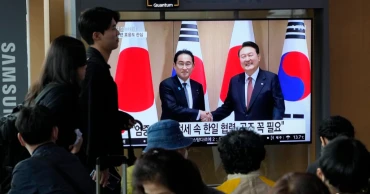
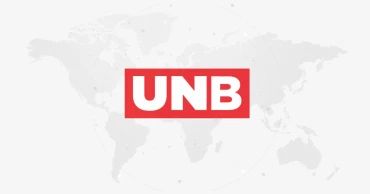
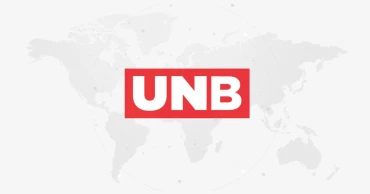
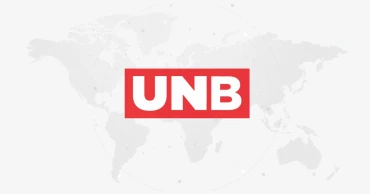
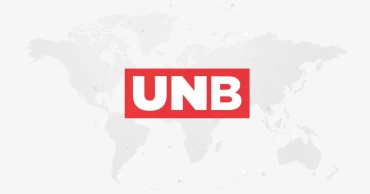

.jpg)
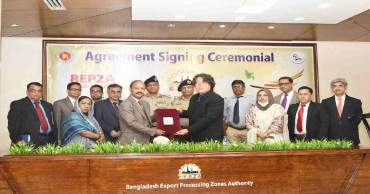
.jpg)






